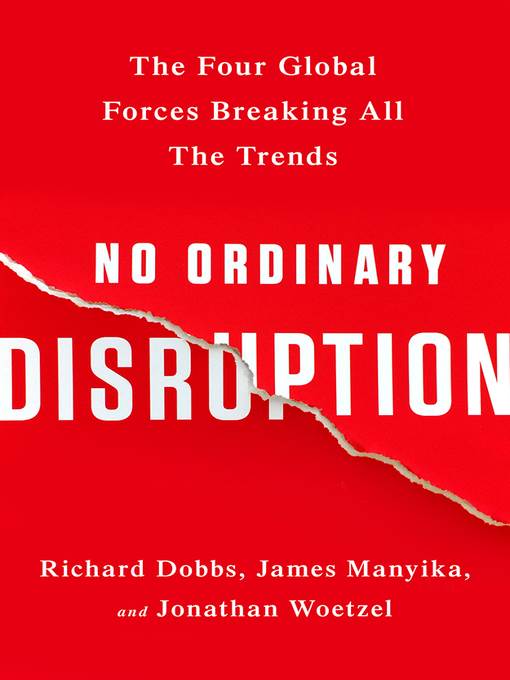
No Ordinary Disruption
The Four Global Forces Breaking All the Trends
کتاب های مرتبط
- اطلاعات
- نقد و بررسی
- دیدگاه کاربران
نقد و بررسی

April 1, 2015
Danger! Opportunity! In this snack from the business-class galley, three McKinsey Global Institute researchers serve up a view of a future that "presents difficult, often existential challenges to leaders of companies, organizations, cities, and countries." Creative destruction is one thing. Plain old destruction is quite another, and in the modern marketplace, it's not always easy to tell the two apart. "Ours is a world of near-constant discontinuity," write Dobbs, Manyika, and Woetzel, which will come as little comfort to those seeking peace and quiet. It's a world of interrupted development, disequilibrium, and a thorough overhaul of whatever once passed for normal. The United States is now exporting oil, India is emerging as a leader in space exploration, and China is developing a large consumer class with new holidays such as Singles Day, a kind of antidote to Valentine's Day. Trend watchers who read the Financial Times and the Economist will know all this, but readers who don't bother to look far beyond our shores may be a little disquieted to learn that part of the disruption is a remaking of the world's emerging markets, especially in unexpected places and to unexpected ends. "Seven emerging markets," write the authors, "will be fueling almost half of all global GDP growth over the coming decade," the news there being that Indonesia and Turkey now figure on the list. Other pieces of the authors' puzzle should surprise no one: the world, for instance, is getting grayer, they observe. Some of the authors' closing recommendations are standard business dictums: get more agile, get smarter. But some go deeper, such as the idea that government regulation, so often the bugaboo of the financier class, can actually be put to advantage to "set standards and define the rules of conduct and markets." Libertarians may squall, but investors just beginning to look at emerging market trends may find value in this book.

April 1, 2015
Technology and extreme growth in developing countries is changing the marketplace and challenging years of conventional market wisdom, with emerging-market companies able to challenge world markets faster then ever. Coauthors Dobbs, James Manyika, and Jonathan Woetzel, directors of the McKinsey Global Institute, identify four disruptive forces creating a dramatic transition in the world economy, a transition they argue will have a greater impact than the industrial revolution. The forces include the shifting of economic activity from the developed to the developing world, the speed and economic impact of technological advancement, changing world demographics as birth rates decrease, and global interconnectivity--allowing for competition from every corner of the world. The authors state that this work is not intended as a business self-help guide with steps to follow. Instead, they defend their claims while utilizing a multitude of examples from Facebook and WeChat to textile companies, thereby illustrating unexpected market challenges and the impact of technology. VERDICT While, as the authors acknowledge, this is not a how-to resource, it is nonetheless an intriguing work for those interested in the business impacts of globalization.--Casey Watters, Shanghai Jiao Tong Univ.
Copyright 2015 Library Journal, LLC Used with permission.

























دیدگاه کاربران